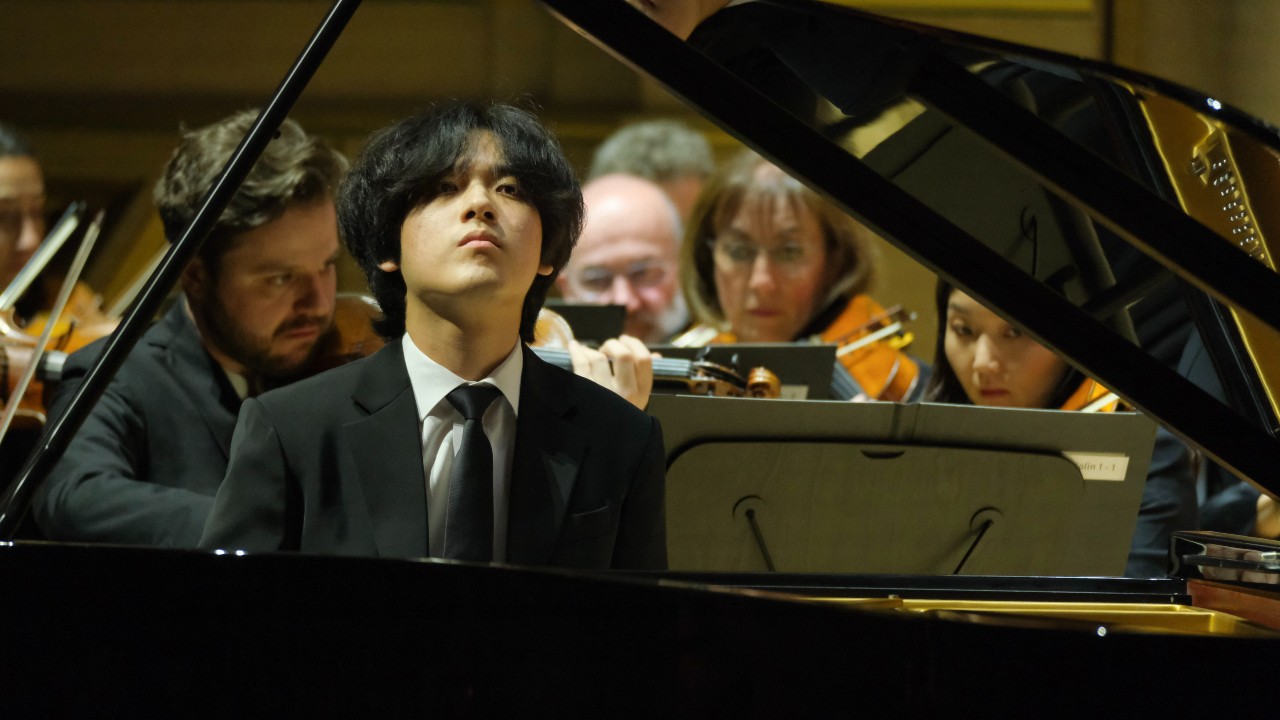San Diego Classical Music Scene Shines with Pianist Yunchan Lim, the LSO and International Acclaim


San Diego’s classical music scene enjoyed a triple blessing last week.
The remarkable Korean wunder-pianist Yunchan Lim demonstrated why he is so much more than just the latest amazing young musician. The world-class London Symphony Orchestra — playing Rachmaninov’s second piano concerto and Mahler’s first symphony — paid its first visit to San Diego since 2015, courtesy of La Jolla Music Society. And the “bible of classical music,” the United Kingdom’s Gramophone magazine, published an adulatory profile of San Diego Symphony’s Jacobs Music Center with the title “Rebuild It and They Will Come.”
James Jolly’s glowing review both of San Diego’s new hall and its orchestra was a publicist’s dream come true. “I’d wager [the symphony] is about to climb decisively up the league table of American ensembles,” Jolly stated categorically, “worthy to stand alongside its neighbors to the north, the Los Angeles Philharmonic and San Francisco Symphony.”
Ranging beyond the center’s new look and acoustics, Jolly squarely credited Symphony CEO Martha Gilmer and Music Director Rafael Payare for the symphony’s bright prospects, mentioning both the symphony’s new recording and broadcasting capabilities, and the strings’ improved sound since Payare shifted to a European positioning of violins, violas, cellos and double basses.
The San Diego Symphony audience “really love[s] their music!,” Jolly enthused, predicting “transformative” benefits for the orchestra. In classical music’s tight-knit world, the imprimatur of the English language’s oldest continuously published classical music magazine is the musical equivalent of a papal blessing.
Much ink has been spilled dissecting what makes the London Symphony Orchestra, by general agreement, among the world’s ten best. There’s the velvety finish and urgent attack of the LSO’s strings, led by Andrej Power. The French horns, headed by Diego Incertis, play with a single, noble voice. Individual players like James Fountain (trumpet), Gareth Davies (flute), Sergio Pires (clarinet), Chi-Yu Mo (E-flat clarinet), Daniel Jemison (bassoon), Ben Thomson (tuba), and Patrick King (timpanist), Rodrigo Moro Martin (double bass) flashed best-in-class virtuosity.
But it was the LSO’s well-tooled precision and unanimity of ensemble that struck this listener most. Enhanced by Music Director Anthony Pappano’s obvious insistence on tight, hair-pinned entrances and exits, the net effect Friday night at Jacobs Music Center was of single-minded unity and almost visible esprit de corps.
With his balletically broad arm gestures and ever-in-motion jaw (as if singing the melody to himself), Pappano directed an enthralling, occasionally thrilling Mahler First. It was also notably slower than most — leaning toward the longer end of most conductors’ timings, in the eight-minute second movement (Kräftig bewegt) even exceeding it. This could be why Pappano’s Titan symphony rarely felt like other interpreters’ Mahler Firsts: the psychologically fraught journey of the composer-hero.
Pappano spotlighted the music itself, letting us luxuriate moment by moment in its unfolding contrasts and colors — the “long line” be damned. With the Jacobs Center providing the best possible sonic canvas, the LSO brought a nice klezmer lilt to the “Feierlich und gemessen” third movement and real terror to the opening shriek and Hammerschlag of the fourth.
When the LSO (led by Michael Tilson Thomas) visited San Diego a decade ago, wunder-pianist Yuja Wang shared Gershwin’s Piano Concerto in F, whose 1928 European premiere took place in London. The concerto performed Friday night with such grace, taste, and maturity by twenty-year-old phenom Yuncham Lim — Rachmaninoff’s second — has deeper London roots.
In Rachmaninoff’s March 1899 visit to England, the Philharmonic Society invited him to return in 1900 but on condition he perform a new concerto. To do that, Rachmaninoff had to break out of a three-year depression following his first symphony’s disastrous 1897 premiere. Hypnosis and affirmational treatments — and direct discussion of his unwritten second concerto — with a Dr. Nicholai Dahl did the trick. By end-of-summer 1900 opus 18 was done.
Lim — greeted by movie-star cheers before he’d played a note — could easily have treated the Rach 2 as a platform for flamboyant pyrotechnics and glam posing. That’s not his style. Polite, self-effacing, and intensely serious about music, Lim delivered the concerto with pellucid tone and effortless clarity and elegance, stripping the treacle that’s built up on the score.
Compared to the Rach 3, which helped Lim become the youngest-ever winner of the Van Cliburn competition in 2022, the second concerto’s thickly voiced chordal passages and intricate cross rhythms presented fewer challenges for Lim’s breathtaking technique. His mature, uncommonly wise respect for the music was exactly what this piece needed.
Lim’s eight-minute encore was a shimmering, mesmerizing Sonnet 104 del Petrarca from Franz Liszt’s Années de pèlerinage (1838-39).
Paul S. Bodine has been writing about music — from classical to pop/rock — for over 30 years for publications such as Classical Voice North America, Times of San Diego, Orange County Register, and Milwaukee Journal Sentinel. Among the artists he’s interviewed are Joshua Bell, Herbert Blomstedt, Sarah Chang, Ivan Fischer, Bruno Canino, Christopher O’Reilly, Lindsay String Quartet, and Paul Chihara.
Categories
Recent Posts










GET MORE INFORMATION


